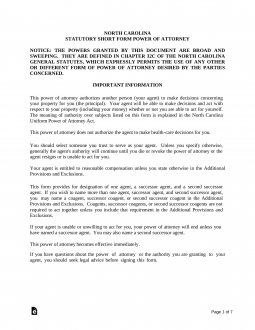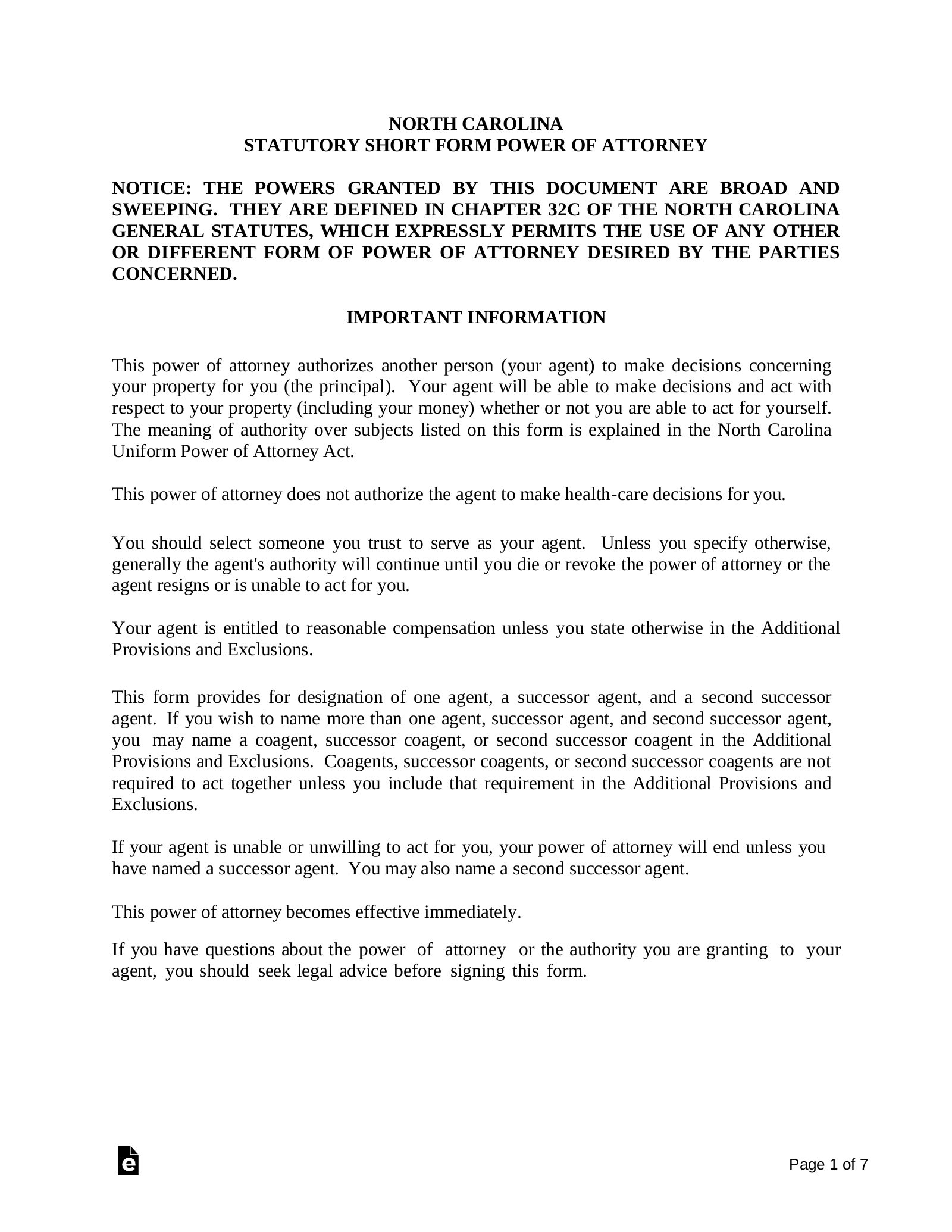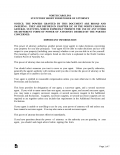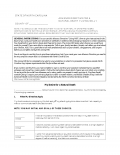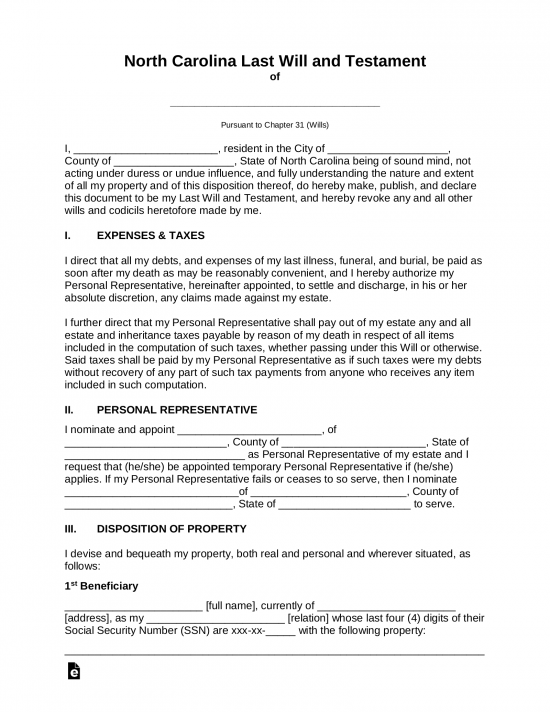Updated December 08, 2023
A North Carolina durable power of attorney form allows a person to appoint someone else to make decisions and conduct financial matters on their behalf during their life. The form, unless otherwise stated, is durable, which means it will continue to be valid in the event the principal should become incapacitated. After the principal and agent sign in the presence of a notary public, the agent can use the form by presenting a copy to any third party when acting on the principal’s behalf.
Versions (2)
Download: PDF
Table of Contents |
Laws
Chapter 32C (Uniform Power of Attorney Act)
Definition of “Durable”
With respect to a power of attorney, the incapacity of the principal does not terminate the power of attorney (§ 32C-1-102(2)).
Definition of “Power of Attorney”
A writing or other record that grants authority to an agent to act in the place of the principal, whether or not the term power of attorney is used (§ 32C-1-102(9)).
Signing Requirements
A notary public must witness the principal’s signature. If the optional Agent Certification is completed, then the agent must also sign in the presence of a notary public (§ 32C-1-105).
Statutory Form
The North Carolina legislature has made available a sample statutory power of attorney form at § 32C-3-301.
How to Write
1 – Download The Paperwork On This Page To Delegate Durable Financial Powers To An Agent
The template supplied through this page will act as a hardcopy tool a Principal may use to appoint an Agent with his or her Authority. Select one of the buttons displayed with the preview on this page to obtain a workable copy. After downloading this form as a PDF, Microsoft Word (.docx), or OpenDocument (.odt) file, open it, then present it to the Principal. He or she should read this document thoroughly, paying close attention to the notice on the first page.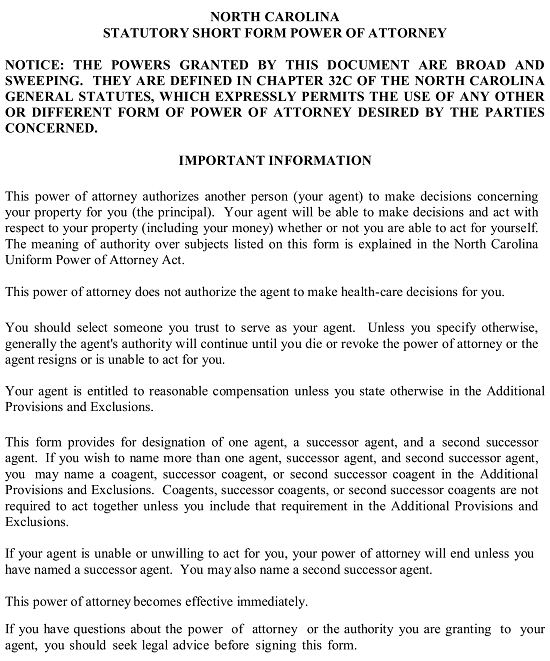
2 – Introduce Each Party Concerned With This Appointment
Once the first page has been read and comprehended by the Principal, we may prepare this document for his or her attention. The Principal named in this document will be the entity who will grant his or her Authority to an Attorney-in-Fact or Principal. We will name both of these entities at the beginning of this form in the “Designation Of Agent” statement.
The Principal should be identified on the very first blank space in this statement. His or her Full Name should be recorded here.  Next, on the empty line to the right of the words “Name Of Agent,” record the Legal Name of the Attorney-in-Fact who will act as the Principal’s Agent with respect to this delegation.
Next, on the empty line to the right of the words “Name Of Agent,” record the Legal Name of the Attorney-in-Fact who will act as the Principal’s Agent with respect to this delegation.  In many cases, the Principal will elect to name a Successor Agent who can act as the Principal-Agent if the Principal Powers are unavailable to the Principal Agent or the Principal-Agent will not wield Principal Power. The Successor Agent’s Name should be placed on the blank line after the words “Name Of Successor Agent” in the section labeled “Designation Of Successor Agent(s) (Optional)”
In many cases, the Principal will elect to name a Successor Agent who can act as the Principal-Agent if the Principal Powers are unavailable to the Principal Agent or the Principal-Agent will not wield Principal Power. The Successor Agent’s Name should be placed on the blank line after the words “Name Of Successor Agent” in the section labeled “Designation Of Successor Agent(s) (Optional)”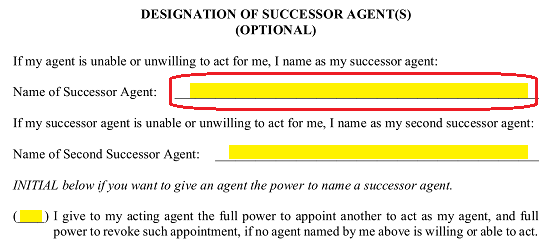 The next blank line in this area will bear the label “Name Of Second Successor Agent.” If the Principal would like to name a Second Successor Agent who will be eligible to wield Principal Power if both the Principal Agent and the First Successor Agent cannot, should not, or will not wield Principal Powers
The next blank line in this area will bear the label “Name Of Second Successor Agent.” If the Principal would like to name a Second Successor Agent who will be eligible to wield Principal Power if both the Principal Agent and the First Successor Agent cannot, should not, or will not wield Principal Powers The final statement in this section will be preceded by a blank line. The Principal can designate the Acting Principal Agent with the Authority to appoint or revoke Principal Powers to other entities by initialing the statement beginning with “I Give To My Acting Agent…”
The final statement in this section will be preceded by a blank line. The Principal can designate the Acting Principal Agent with the Authority to appoint or revoke Principal Powers to other entities by initialing the statement beginning with “I Give To My Acting Agent…”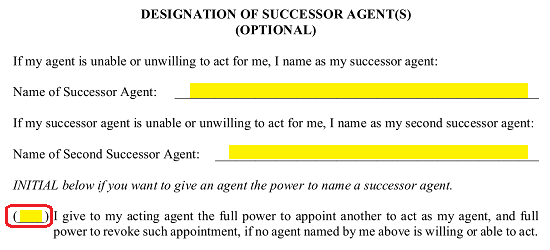
3 – The Principal’s Attention Is Required To Approve General And Specific Powers
The Principal will need to give a review of the General Powers he or she can potentially deliver through the use of this paperwork. They will be structured in a list format in the “Grant Of General Authority” section. The Principal should initial each list item that describes a type of Principal Power the Agent may use when representing the Principal’s interests. If the Principal does not wish one of these items to be in the scope of the Agent’s Principal Power, the Principal should leave it blank. Thus, if the Principal wishes to the Agent to have Authority in matters of “Real Property,” “Tangible Personal Property,” and “Banks And Other Financial Institutions” but not be able to use Principal Power outside of these areas then the Principal should initial the blank line preceding each of these items and leave the rest blank. If the Principal wishes the Agent to have the full scope of these Powers, then only the last item (“All Preceding Subjects”) needs to be initialed by the Principal. 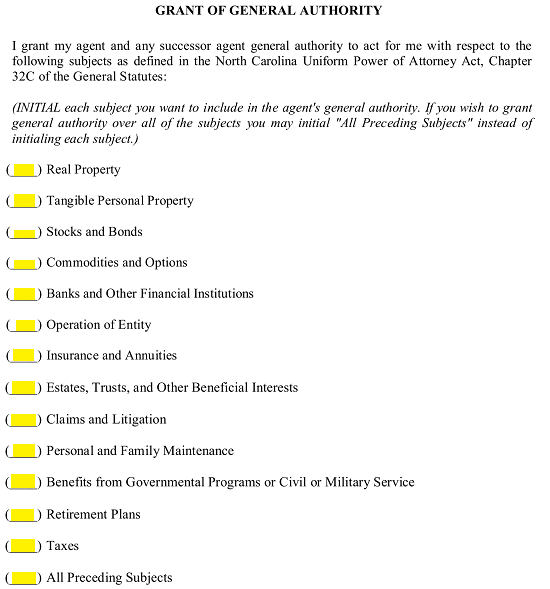 The following section will provide more detailed definitions to the Principal Powers that may be assigned to the Agent here. Locate the heading “Grant of Specific Authority.” In a manner similar to the previous section, the Principal should review the list items in this area and initial each one he or she intends to grant to the Agent.
The following section will provide more detailed definitions to the Principal Powers that may be assigned to the Agent here. Locate the heading “Grant of Specific Authority.” In a manner similar to the previous section, the Principal should review the list items in this area and initial each one he or she intends to grant to the Agent. 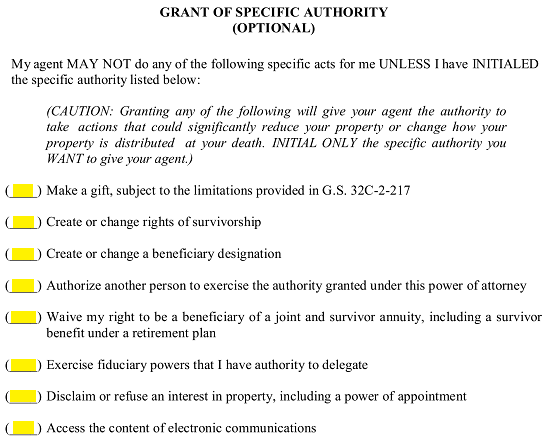 The Principal should initial the first item if he or she has decided the Agent should be able to make Gifts in his or her Name (as per G.S. 32C-2-217).
The Principal should initial the first item if he or she has decided the Agent should be able to make Gifts in his or her Name (as per G.S. 32C-2-217).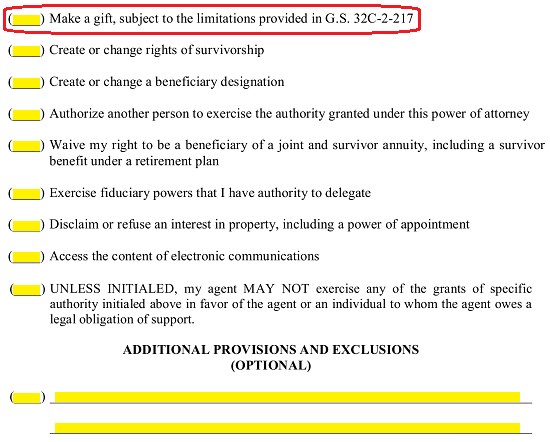
The Agent will be able to use Principal Authority to “Create Or Change Rights Of Survivorship” if the Principal initials the blank line that precedes the second item.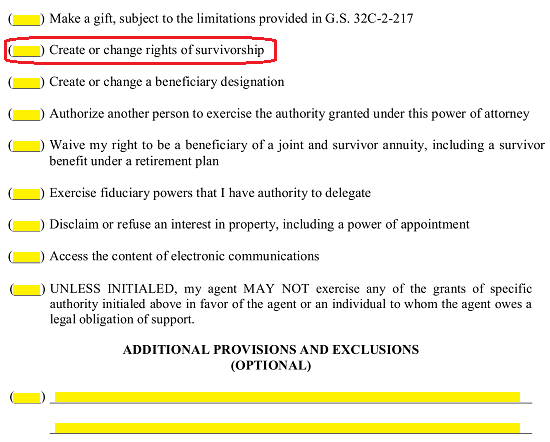
The ability to “Create Or Change A Beneficiary Designation” on behalf of the Principal can be granted to the Agent when the Principal initials the third statement. 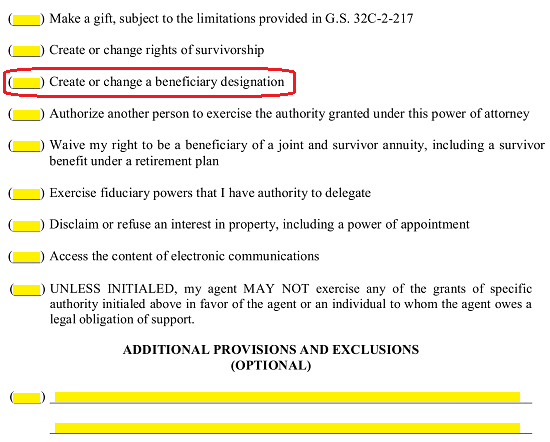 The Principal Authority required to authorize other people with the right to exercise the Principal Powers defined here on behalf of the Principal can be granted to the Agent once the Principal initials the fourth item (“Authorize Another Person…”).
The Principal Authority required to authorize other people with the right to exercise the Principal Powers defined here on behalf of the Principal can be granted to the Agent once the Principal initials the fourth item (“Authorize Another Person…”). 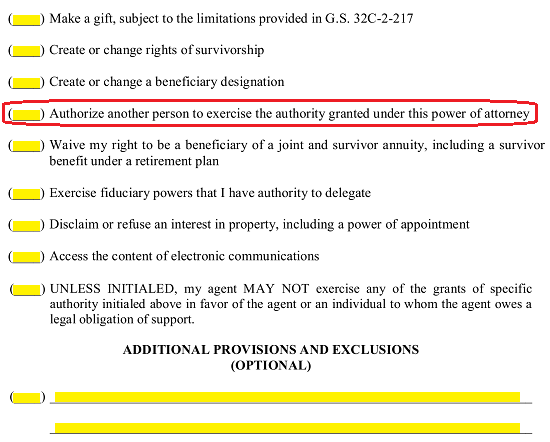 The fifth statement will enable the Agent to waive the Principal’s “…Right To Be A Beneficiary Of a Joint And Surviving Annuity” if it is initialed by the Principal.
The fifth statement will enable the Agent to waive the Principal’s “…Right To Be A Beneficiary Of a Joint And Surviving Annuity” if it is initialed by the Principal.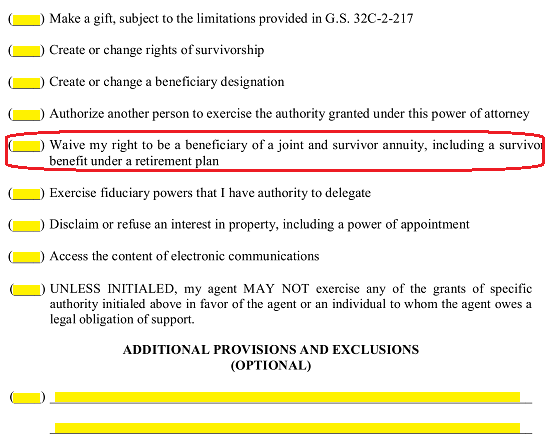 If the Principal has decided the Agent should be able to exercise any Fiduciary Powers of Delegation, he or she wields then the Principal should initial the sixth sentence.
If the Principal has decided the Agent should be able to exercise any Fiduciary Powers of Delegation, he or she wields then the Principal should initial the sixth sentence. 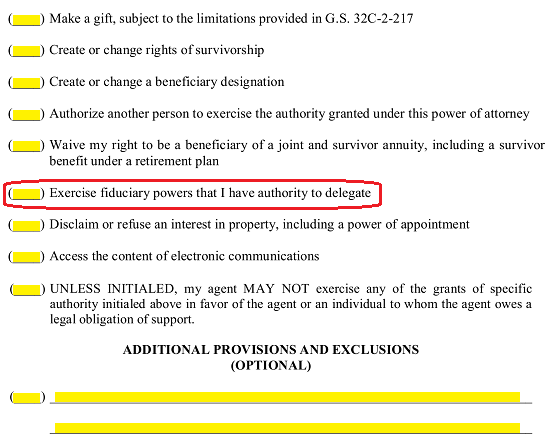 The Agent will have the Principal Authority to “Disclaim Or Refuse” the Principal’s interests in Property (this includes any Power of Appointments to the Principal) if the Principal initials the seventh statement.
The Agent will have the Principal Authority to “Disclaim Or Refuse” the Principal’s interests in Property (this includes any Power of Appointments to the Principal) if the Principal initials the seventh statement. 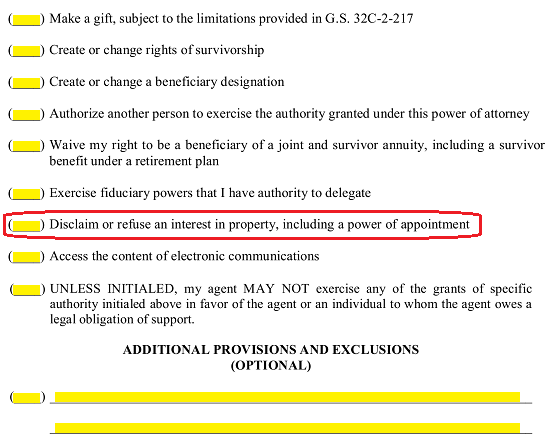 The eighth Specific Power will allow the Agent to access all the Principal’s Electronic Communications (i.e. Fax, Email) and may be granted to the Agent when the Principal initals the blank space that precedes it.
The eighth Specific Power will allow the Agent to access all the Principal’s Electronic Communications (i.e. Fax, Email) and may be granted to the Agent when the Principal initals the blank space that precedes it. 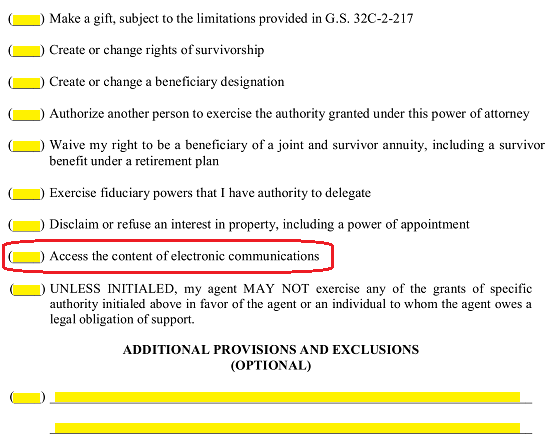 If the Principal wishes to prevent the Agent from using the Specific Principal Authority here in a manner that benefits an Agent or other entity the Agent is legally obligated to support in some way, then the last item should be left blank. If the Principal has decided the Agent may have such discretion, then he or she should initial the last item.
If the Principal wishes to prevent the Agent from using the Specific Principal Authority here in a manner that benefits an Agent or other entity the Agent is legally obligated to support in some way, then the last item should be left blank. If the Principal has decided the Agent may have such discretion, then he or she should initial the last item. 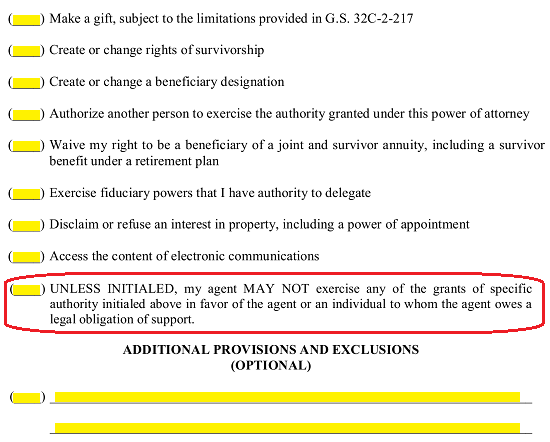 Powers being granted here. If so, such limitations, extensions, or conditions should be reported on the blank lines under the heading “Additional Provisions And Exclusions (Optional).” If any such directives are provided here, the Principal must initial the blank line that precedes this area.
Powers being granted here. If so, such limitations, extensions, or conditions should be reported on the blank lines under the heading “Additional Provisions And Exclusions (Optional).” If any such directives are provided here, the Principal must initial the blank line that precedes this area.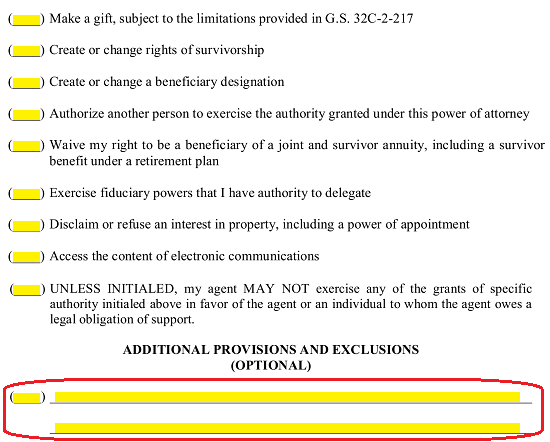
4 – A Guardian Nomination May Be Made Here
If the Principal wishes the courts to take the Acting Agent as a Guardian of his or her body and/or estate into consideration, should this ever be necessary, then he or she should initial the statement in the “Nomination Of Guardian (Optional)” section. 
5 – The Principal Signature Is The Only Tool That Can
The Principal must now read this entire document. If he or she is satisfied with its contents, the “Signature And Acknowledgment” section will require his or her attention. The Principal will need to sign his or her Name on the “Your Signature” line, print his or her Name on the “Your Name Printed” line, then enter the Date these items were supplied on the line labeled “Date.” The Principal should give this document to the Notary Public observing the signing so that he or she may notarize this document in the area below the Principal Signature.
The Principal should give this document to the Notary Public observing the signing so that he or she may notarize this document in the area below the Principal Signature. 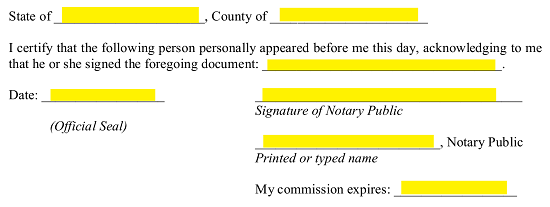 The Agent named here (and the Successor Agent(s)) should read the “Important Information For Agent” section at the end of this paperwork.
The Agent named here (and the Successor Agent(s)) should read the “Important Information For Agent” section at the end of this paperwork.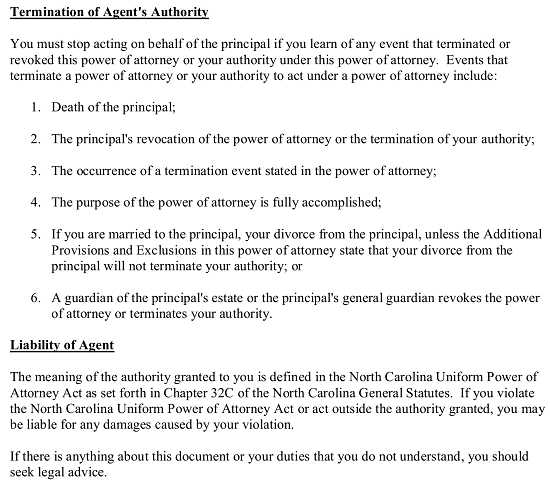
Related Forms
Download: PDF
Download: PDF, MS Word, OpenDocument

